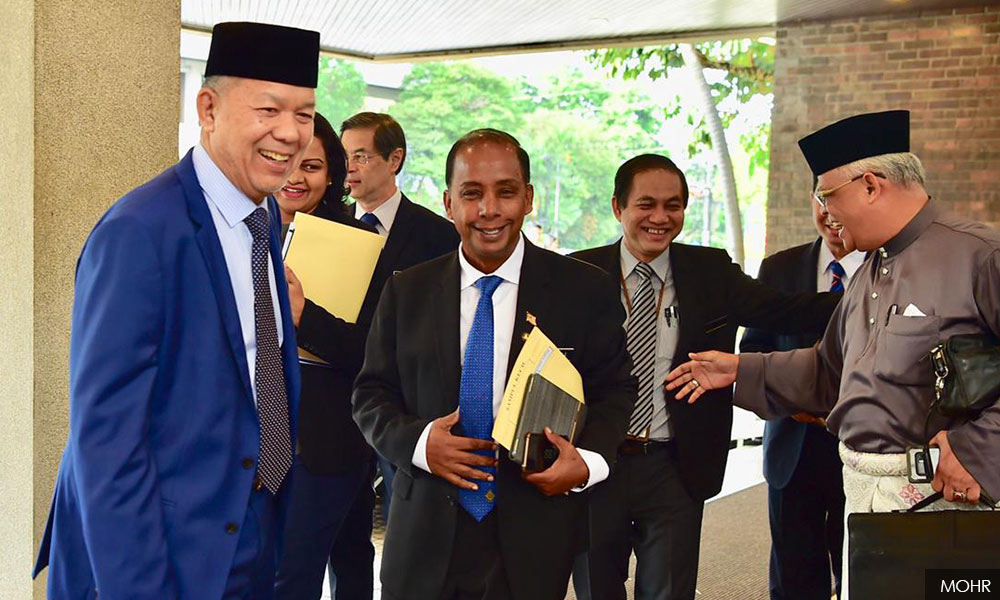LETTER | The Labour Law Reform Coalition (LLRC) congratulates the Ministry of Human Resources for tabling the Industrial Relations Act Amendment Bill in Parliament on Oct 7, 2019.
We observed that there were 30 amendments made to the Industrial Relations Act and three new provisions added.
We recognise the positive aspects of the bill, which will decisively devolve the power of the minister to director-general in many aspects, including direct dismissal cases to Industrial Court if unresolved; allowing to appeal to the High Court by any person dissatisfied with an award and not by way of Judicial Review as currently; the introduction of penalty for non-compliance of court awards and in conformance to ILO Convention 87 on Freedom of Association; allowing the workers to join a union of their choice, which we believe is a game-changer, as with this amendment trade unions in the country will have to work hard and provide the best service to their members and several others.
While most of the amendments are in conformity to the International Labour Organisation (ILO) standards, major sections of the Act which are against the ILO standards were left untouched. The bill, obviously, cannot be said to be a holistic review but more of a piecemeal effort.
The LLRC has engaged the ministry through several stakeholder meetings and provided a comprehensive list of recommendations to strengthen workers’ rights to freedom of association and to facilitate an increase in the unionisation rate in the country, to collectively negotiate better terms and conditions of service.
The ministry’s own proposal under the new Section VIA, which addresses discrimination in employment on the grounds of gender, religion, race or disability that was connected with the employment or the terms of employment or the conditions of work of any such workman, are missing from the Amendment Bill. The bill has obviously not been strengthened in accordance with the international standards as claimed.
The bill attempts to introduce Sole Bargaining Rights in the premise of multiple unions in a single company, with the inclusion of Sections 12A and 12B. This section is enforceable if the company recognises two or more unions’ claim of recognition.

However, it fails to state clearly steps to be taken should an employer fail to recognise more than one union when there are more than one claims. The ambiguity in Section 12A leaves room for further disputes and the ministry should make an attempt to reword the proposed Section so that the clauses can actually take effect.
Recommended amendments provided by LLRC, which the ministry ignored when drafting the bill, which is obviously not aligned with ILO standards, are as follows:
1. We proposed that the definition of “strike” to mean the cessation of normal hours of work by a body of workmen acting in combination, or a concerted refusal or a refusal under a common understanding of a number of workmen to continue to work its normal hours or to accept employment, and includes any act or omission by a body of workmen acting in combination or under a common understanding and to delete “which is intended to or does result in any limitation, restriction, reduction or cessation of, or dilatoriness in, the performance or execution of the whole or any part of the duties connected with their employment;”
2. The definition of “trade dispute” to mean any dispute between an employer and his workmen which is connected with the employment or non-employment, the terms of employment or the conditions of work of any such workmen, including matters relating to check-off, cost of living allowance, bonus and any other allowances;
3. To add a new provision in Section 4(4): No employer or trade union of employers and no person acting on behalf of such employer or such trade union shall refuse to make deductions in respect to payments to a registered trade union of any sum of money due to the trade union by the employee on account of entrance fee, subscription, levy or other dues as requested by the trade union, provided that the employee shall notify the employer that he would like to be exempted. The provision on Check-Off, where union dues are automatically deducted from employee wages once recognition of a union is granted, should have been included in the Bill to inculcate industrial harmony;

4. To include in Section 5(c) on the prohibition of employers to discriminate against any person in regard to employment, promotion, wages, increment, bonus and other monetary benefits and any condition of employment or working conditions on the ground that he is or is not a member or officer of a trade union;
5. We proposed to add new provision in section 6(1): A workman intending to carry out his duties or to exercise his rights as an officer of a trade union shall be seconded to perform his duties for the duration of his tenure to the post as an officer of the union, with pay from the employer;
6. A new provision in section 6(2): The employer shall grant an exemption for one union official per thousand employees or less. For every 1,000 employees or part thereof, one additional officer;
7. We proposed to add a new provision in Section 8(5): Any person who contravenes any provision of Section 4, 5 and 7 shall be guilty of an offence and shall be liable, on conviction, to imprisonment for a term not exceeding one year or to a fine not exceeding RM10,000 or to both. The Industrial Court shall submit the award to the Sessions Court for its execution;
8. The bill does not tackle the archaic provisions that stifle trade union growth in the country and provides very little potential to achieve the human resource minister’s ambitions of increasing a nationwide unionisation rate from six percent to 30 percent. We refer to Section 9 of the IRA, which needs to be amended to release the stranglehold these provisions have on trade union recognition by adding the words "majority representation of those who prefer trade union representation determined against votes cast” and not against total employees of the electoral roll. In the current practice, ballots that had not been cast by absentee workers, those who have resigned and deceased will be tabulated as votes not in favour of trade union representation.

9. Also in Section 9 of the Act, workmen of the lower category who are under confidential or security capacity have not been removed in the bill to enable them to join a trade union and this is a discriminatory practice, which has denied the lowest section of workers the benefit of trade union representation. It is a shame that the government sees it fit to continue this discrimination when these workers, in no way, carry high level confidential or security matters that can be detrimental to the company. The bill is obviously not aligned with ILO standards;
10. To add new provision in Section 9(1): No trade union of workmen, the majority of whom indicate preference to be represented by the trade union, who are in employment and who are not employed in any of the following capacities, that is to say - (a) managerial capacity; (b) executive capacity; - may seek recognition or serve an invitation under Section 13 in respect of workmen employed in any of the abovementioned capacities with reference to or be guided by the classification under the Malaysian Standard Classification of Occupation (Masco), published by the Ministry of Human Resources;
11. Another instance was that the right to information proposed under Section 13(10), to provide company financial status, etc, to the union for the purpose of collective bargaining; right to negotiation on collective redundancy proposed under Section 13(11), which could protect the best interest of workers when the companies are winding down;
12. We recommended the removal on the limitations on strikes on any matters covered by Section 13(3) and 44(e), which are against the ILO standards; and
13. The essential services listed in the bill fail to comply with ILO standards. The ILO Committee on Freedom of Association has clearly said that public waste
management, chemistry, custom, meteorology, food to pupils and cleaning of schools should not be deemed as essential services.
The Act also does not spell out the procedure to file a complaint under Section 59. The lacuna in this section is too glaring and had been in the statutes from the beginning, rendering the section toothless. Also, does the Industrial Court, which is a tribunal, have the powers to impose a fine or imprisonment terms? If so the procedure is not spelt out.
In conclusion, we urge the human resources minister to re-look at the Act and to include the above recommendations into the Amendment Bill to strengthen the Act as we feel it is still a work-in-progress effort.
Formerly known as Coalition of 58 Trade Unions and NGOs, the Labour Law Reform Coalition is endorsed by 58 trade unions from various sectors and worker organisations.
The views expressed here are those of the author/contributor and do not necessarily represent the views of Malaysiakini.

